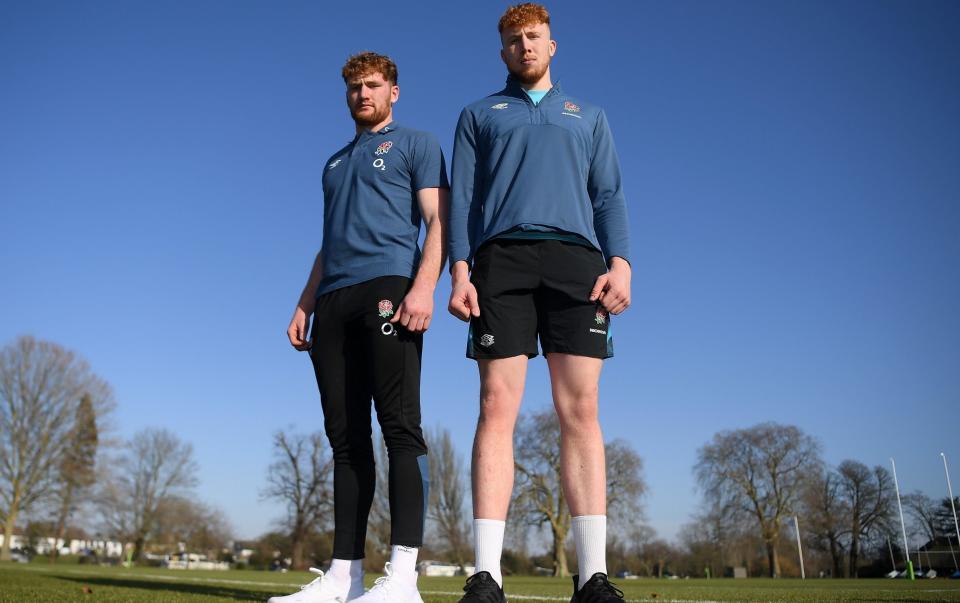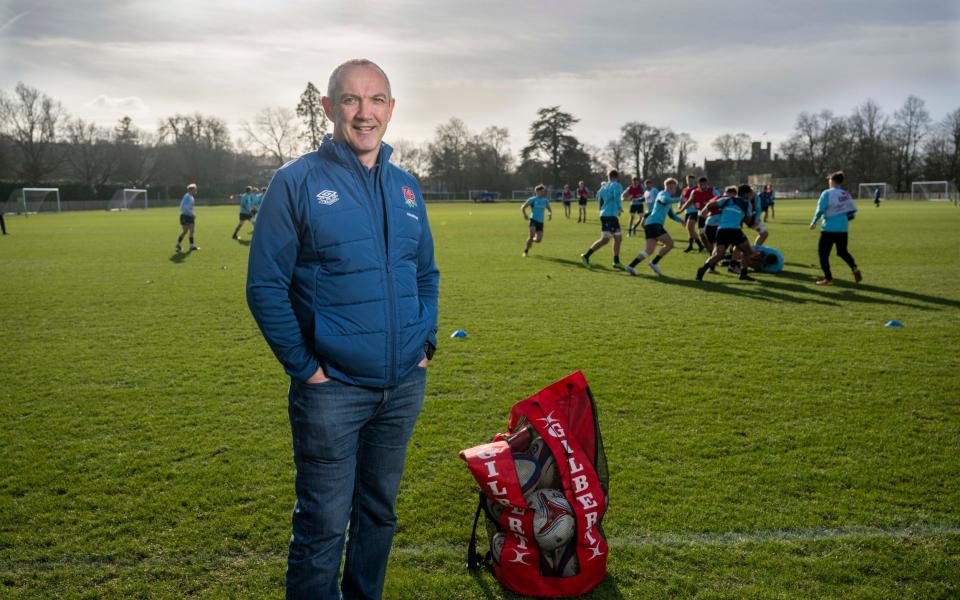Three tighthead prospects, two giant locks and a World Cup bolter: Inside England's talent factory

It is a crisp sunlit winter’s morning at the Bisham Abbey national sports centre in Berkshire. There is little sign of activity across the campus except for the rugby pitch farthest from the manor house that was once the home of Henry VIII.
From a distance it looks every bit like a senior England rugby squad training session. Two of the forwards in white bibs stand at over 6ft 7in and 6ft 8in respectively while the heaviest player weighs in at almost 21stone.
A couple of former international head coaches watch on as the group undertake a variety of skill-based exercises before moving onto set-piece work, game scenario drills and kicking practices.
It is a slick, tightly-run session and the players are constantly challenged by the drills and the coaches who take them out of their positional comfort zones. The sheer physicality and quality of the exchanges stands out.
But this is not one of Steve Borthwick’s squad sessions. This is the work being done behind the scenes to improve the supply lines to the senior national side.
If this year’s Guinness Six Nations championship has so far been an underwhelming one for England, their supporters should take some heart about what was on show on that chilling February morning. Welcome inside England’s talent factory.
A bolter could force his way into 2023 World Cup squad
When Borthwick took over the senior England job from Eddie Jones in December, he discovered a talent depth chart in the professional game that alarmed him. There were significant gaps at second row, hooker and tighthead prop, raising future concerns about England’s traditional strengths in the tight five; inside centre was also a worry.
One wonders how on earth the best resourced union in world rugby allowed itself to get into this position, but that is for another day. What is clear now is that after spending the morning with the England U20s squad that has made an impressive start to their Six Nations campaign, those supply-line issues already appear to be well on their way to being rectified.
The side, coached by Alan Dickens and Andy Titterell, are currently top of the table after three rounds following bonus-point victories over Scotland, Italy and Wales, are on course for a potential Grand Slam showdown with their Irish counterparts in the final round. Hopes are high too for the first return of the World Rugby Under-20s Championship in July for the first time since the pandemic.
Yet more significantly than any results at this level, there is genuine optimism that within the squad there are a number of players with the ability, physical attributes and character to make a major impact not just in the professional club game but also on the international stage. The group of players coming through have a diverse range of interests with Harlequins full-back Conor Slevin a good example having played the trumpet at Ronnie Scott's.
Some seasoned observers suggest there may even be a bolter that could yet force himself into contention for Borthwick’s World Cup squad bound for France in September.
What will also hearten Borthwick is that the defining strength of the squad this year can be found in the forward pack.
If more backs have come through over the last two years - Henry Arundell and Fin Smith from last year’s side, and Jack van Poortvliet and Raffi Quirke from the previous year, there are at least six forwards who have been ear-marked as having top-flight potential.
The totemic figure is Lewis Chessum, younger brother of the outstanding rookie in Borthwick’s pack, Ollie. His no-nonsense character has earned him the captaincy and, at over 6ft 7ins and almost 19st, the 20-year-old, who has just celebrated his birthday, looks set to have a remarkable physique when he “gets used to his body”.

Robert Carmichael, another second row from Leicester Tigers who is still 19, is over 6ft 8ins and weighs almost 19st, while Afo Fasogbon, the 18-year-old London Irish prop, is already 6ft 3ins and over 20st.
If Martin Johnson’s gnarled pack picked up the nickname the ‘white orcs’ on the way to winning the World Cup, 20 years on, England appear to have unearthed even bigger successors.
Fasogbon is one the three tighthead props in the squad with Tim Hoyt (Leicester) and Asher Opoku-Fordjour (Sale Sharks), all of whom Conor O’Shea, the former Italy and Harlequins head coach who is now the RFU’s executive director of performance rugby, believes have a big future ahead of them.
“We have got three incredible prospects there,” said O’Shea. “They have to be nurtured and pushed through and make sure the right programme is put around them – and their clubs are aware – because I think there are three that can play Premiership and beyond and if we can do that then you have three more tightheads marauding around the pitches, which is what you want.
"We have a lot of forwards who are back for a second year, which is so important at this level and they are different animals this year. Over the last couple of years, we have produced some special backs. There are some good footballers here as well but we have a lot of forwards who are back for a second year, which is so important at this level and they are different animals this year.
“Behind the scenes we have identified five or six players at U18s and U20s and making sure that we put a little bit more attention into making sure that they can become the best they can be.”

O’Shea says there is a Covid factor at play here, as the suspension during lockdowns and then the subsequent impact on scrummaging and mauling had a lag effect on the development of elite forwards.
Yet it seems too that the continuity afforded by the appointment of Dickens, Jonathan Pendlebury and Mark Mapletoft with England U18s head coach back in 2019 has also been key. It followed several years of turmoil when the previous pathway coaching structure was dismantled under Dean Ryan, the former head of the RFU’s international player development.
There has also been a greater focus on the relationship with the clubs, focusing on skill development, while some players are advised on transitioning to new positions, for example from back row to hooker, if it is felt they have a chance to reach the international stage.
“When I started this job in January 2020, in the previous couple of years the pathway in the men’s side had become part-time in nature in terms of the coaching,” said O’Shea. “That meant that feedback to the players and their clubs had become too loose because people weren’t focused on that side of the job.
“Covid then brought all its challenges but what we said was that there could be no compromise on the coaching and we have now had great consistency over the last three years.”
“One of the areas that we do want to improve in terms of helping support and really underpin both club and country is on the specialist skill side of things.”
Coaching the coaches
That includes coaching the coaches. During the session at Bisham Abbey, Brian Ashton, the former England head coach who took the side to the 2007 World Cup final, and is regarded as one of the country’s finest attacking brains, walks up and down the pitch, scanning as he goes.
“Brian’s involvement is fantastic in terms of both from a coaching development point of view but also broadening the players’ horizons,” adds O’Shea.
Ian George, the father of England hooker Jamie and the personal development manager at Saracens academy, is also at the session. He helps the player development from an education point of view, while Nigel Redman, the RFU’s team performance director is also in attendance.
Encouragingly, six of the squad have already made their Premiership debuts, while all but one have represented their clubs in the Premiership Cup.
There may be much work to be done to ensure there is greater integration between club and country to the level that Ireland have achieved with a much smaller playing pool, including the guarantee of greater game time for the country’s best young talent in the professional structures.
But with Borthwick lobbying for more access to players as part of the new professional game agreement which is due to start next year, and more specialist coaching resources available to clubs to support player development, it seems that any holes in the depth charts are likely to be quickly filled in the next two years.
“I think it's up to us now leading into the next PGA over the next number of months to say: ‘Okay, what can we do better?’” added O’Shea. “Because we all want the same thing. We want successful clubs, we want a successful England team. And then you've got a great game that's really vibrant.
“I'd like this group to go and dominate their own age level, which is something I think they should do and learn that they're the best in their age group. I'd love this group to go to the World Cup this summer (in South Africa) and see where they can get to.”
And could we see any of them in the senior World Cup in France a couple of months later? “There might be one.”

 Yahoo Sport
Yahoo Sport 





































